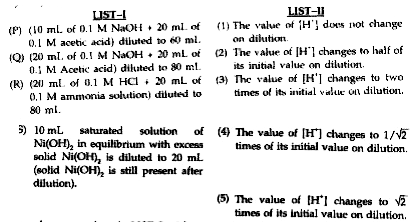Dilution processes of different aqueous solutions, with water, are given in LIST-I. The effects of dilution of the solutions on are given in LIST-II. (Note: Degree of dissociation of weak acid and weak base is 1, degree of hydrolysis of salt represents the concentration of ions)
![Dilution processes of different aqueous solutions, with water, are given in LIST-I. The effects of dilution of the solutions on [H^(+)] are given in LIST-II. (Note: Degree of dissociation (alpha) of weak acid and weak base is ltlt 1, degree of hydrolysis of salt ltlt 1, [H^(+)] represents the concentration of H^(+) ions)](https://d10lpgp6xz60nq.cloudfront.net/physics_images/JA_18_CHE_P2_E02_018_Q01.png)
The correct Answer is:D
Step by step video, text & image solution for Dilution processes of different aqueous solutions, with water, are given in LIST-I. The effects of dilution of the solutions on [H^(+)] are given in LIST-II. (Note: Degree of dissociation (alpha) of weak acid and weak base is ltlt 1, degree of hydrolysis of salt ltlt 1, [H^(+)] represents the concentration of H^(+) ions) by Chemistry experts to help you in doubts & scoring excellent marks in Class 12 exams.
Updated on:21/07/2023Topper's Solved these Questions
Similar Questions
Dilution process of different aqueous solution , with water are given in List-I. The effects of dilution of the solutions on [H+] are given in List-II. (Note : Degree of dissociation (α) of weak acid and weak base is ltlt 1, degree of hydrolysis of salt <<1,[H+] represents the concentration of H+ ions)
∣∣ ∣ ∣ ∣ ∣ ∣ ∣ ∣ ∣ ∣ ∣ ∣ ∣ ∣ ∣ ∣ ∣∣ List-I List -II(P)(10 mL of 0.1 M NaOH+20 mL of 0.1 acetic acid)dilutes to 60 mL(1)The value of [H+] does not change on dilution(Q)(20 mL of 0.1 M NaOH + 20 mL of 0.1 M acetic acid)diluted to 80 mL(2)The value of [H+] change to half of its initial value on dilution(R)(20 mL of 0.1 M HCl + 20 mL of 0.1 M ammonia solution)diluted to 80 mL(3)The value of [H+] change to two times of its initial value on dilution(S)10 mL saturated solution of Ni(OH)2 in equilibrium with excess solid Ni(OH)2 is (4)The value of [H+] changes to 1√2 times of its initial value on dilutiondiluted to 20 mL (solid Ni(OH)2 is still present after dilution)(5)The value of [H+] changes to √2 times of its initial value on dilution∣∣ ∣ ∣ ∣ ∣ ∣ ∣ ∣ ∣ ∣ ∣ ∣ ∣ ∣ ∣ ∣ ∣∣
View SolutionHA is a weak acid. The pH of 0.1 M HA solution is 2. What is the degree of dissociation (α) of HA ?
View Solution
Knowledge Check
Dilution processes of different aqueous solutions with water are given in LIST-I. The effect of dilution of the solution on [H+] are given in List =II.
 AP-4, Q-2, R-3, S-1BP-4, Q-3, R-2, S-3CR-1, Q-4, R-5L S-3DP-1, Q-5, R-4, S-1
AP-4, Q-2, R-3, S-1BP-4, Q-3, R-2, S-3CR-1, Q-4, R-5L S-3DP-1, Q-5, R-4, S-1The degree of hydrolysis of a salt of weak acid and weak base in its 0.1 M solution is 0.2 M, the precentage hydrolysis of the salt should be
A50%B35%C75%D100%Degree hydrolysis (h) of a salt of weak acid and a strong base is given by
Ah=√KhcBh=√KhCh=√cKhDh=√KwKb
HA is a weak acid. The pH of 0.1 M HA solution is 2. What is the degree of dissociation (α) of HA ?
View SolutionThe degree of dissociation α of a week electrolyte is
where n is the number of ions given by 1mol of electrolyte.
View SolutionHA is a weak acid and BOH is a weak base. For which of the following salts the extent of hydrolysis is independent of the concentration of the salt in its aqueous solution
View SolutionThe pH of a 0.1 M aqueous solution of a weak acid (HA) is 3. What is its degree of dissociation ?
View SolutionThe pH of a 0.1 M aqueous solution of a weak acid (HA) is 3. What is its degree of dissociation ?
View Solution
